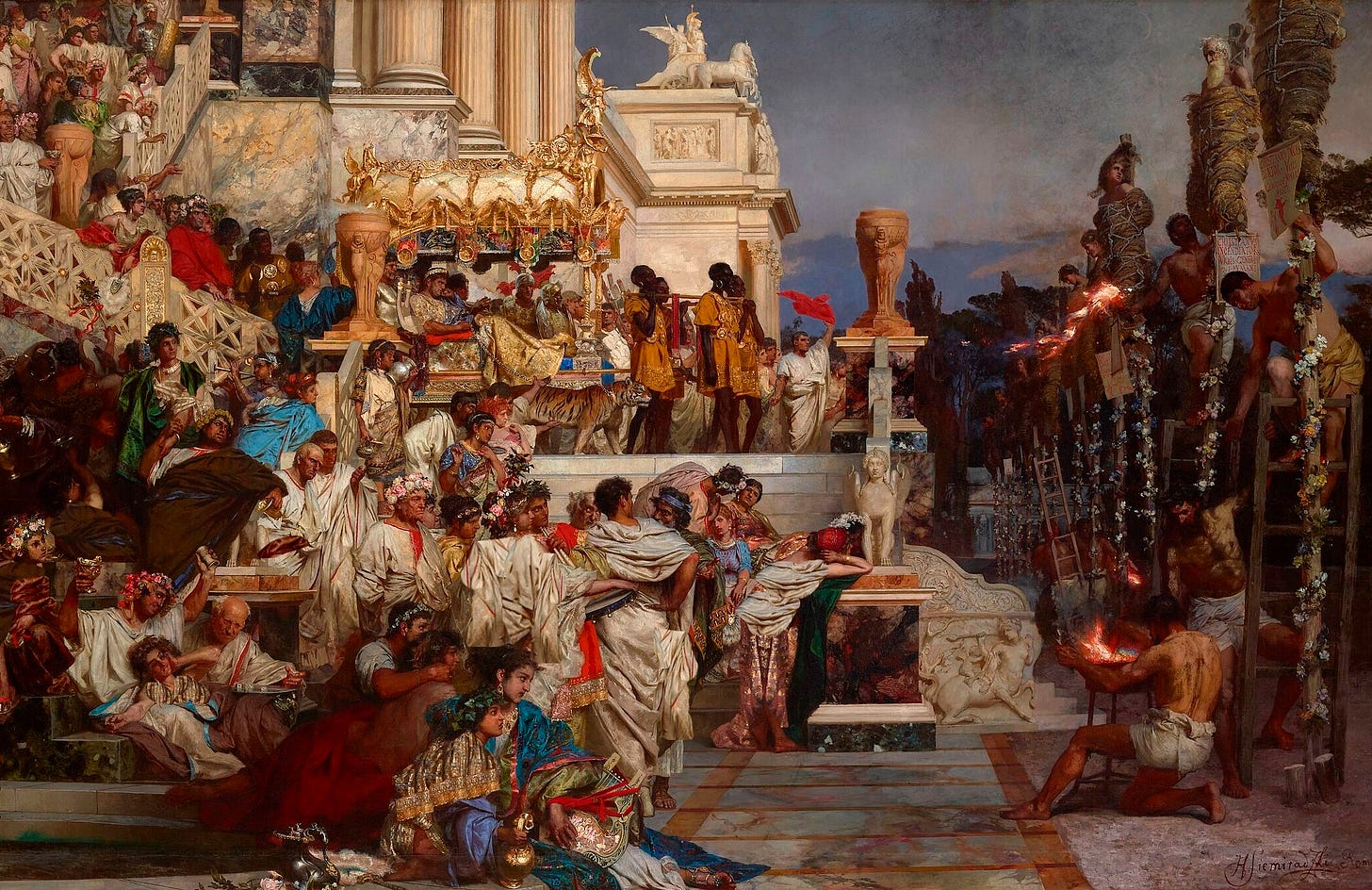What are the forces that drive the persecution of the Church?
Fr Coleridge sets out five sources which give rise to the persecution of the Church. Here are four of them.

Fr Coleridge sets out five sources which give rise to the persecution of the Church. Here are four of them.
Editor’s Notes
In this part, Fr. Coleridge explains how the persecution of the Church arises from five main sources:
Promptings of the devil
Jealousy and hostility of the temporal power
Public calamities blamed on Christians
Corruption and sensuality of mankind
Zeal for false religious systems.
This section deals with the first four – leaving the effect of false religious systems for the next.
For more on this section, its place in the Gospel and the Liturgy, and the role of persecution as a “quasi-mark” of the Church, see Part I. (It has been updated since it was published.)
Hatred of the World
Passiontide, Part III
Chapter III
St. John xv. 11-27.
Story of the Gospels, § 156
Burns and Oates, London, 1892
Why did Christ say his people 'hated both me and my Father'?
Why does Christ say the Holy Ghost 'shall bear testimony of Me'?
What are the forces that drive the persecution of the Church?
Reasons for the hatred of the Church
A great Catholic commentator on the Gospel of St. John, to whom, perhaps, more than to any other single writer, these pages are indebted, has drawn out in one of his annotations what he considers to have been the chief causes to which the persecutions which have been suffered by the Church may be attributed.
They are causes which we can easily see to lie in the nature of things and the condition of the world, and they consequently cannot be expected to be ever altogether inactive or inoperative.
The first of these he finds in the never sleeping or relenting activity of the spiritual enemies of God and man, working through and on their instruments among mankind themselves, at one time rulers, whom they excite to persecution or to hatred of the truth, or of virtue, or to others whom they stir up in various ways to whatever may seem to them likely to bring dishonour to God and to hinder the salvation of men.
St. Paul speaks most earnestly of this in the famous passage at the end of the Epistle to the Ephesians, where he addresses himself more especially to the priests, urging them to be strengthened in the Lord and in the might of His power. The language is of itself a proof how much he thought of the adversaries with whom the Christian ministers had to contend.
‘For our wrestling is not against flesh and blood, but against principalities and powers, against the rulers of the world of this darkness, against the spirits of wickedness in the high places.’1
And in other passages he shows that he has continually in his mind the activity of the devil in opposing, by all means in his power, the merciful work of redemption committed to the Church. It cannot be said of the devils that, in one sense, they have not known the Father and the Son, though it appears likely that their fall from Heaven was brought about in consequence of their refusing to acknowledge the supreme majesty of the Eternal Son, dwelling among men in the Incarnation.
Malice of the devils
The Fathers echo the thought of St. Paul, and constantly attribute the persecution of the Church to the malice of the devil. It is the policy of Satan to hide himself in his warfare against the Church, not only using human instruments for her enslaving, or for the hindrance of her beneficent operations, but taking care that the workings of his malice appear to be the natural effects of human policy.
On the other hand, it is the true instinct of the saints of God to discern, in what seems merely human opposition, the craft and deceit of the enemy of God. We are sometimes struck by the cleverness and cunning by which the opposition to a scheme of good is raised of a sudden, and in some unexpected quarter, especially among good men. But few of us are as watchful and cautious as we ought to be against the powers of evil, and we let pass many opportunities of guarding against their devices, and so often enable them to succeed in their attempts ad minorem Dei gloriam.
For the prevention of a great evil does not always involve the prevention of a less evil, and the enemies of all good are well pleased to content themselves with small gains, when they cannot get greater successes, while yet we might, by more prayer and vigilance, have prevented them from having any at all.
Cardinal Toletus mentions four other causes which he assigns to the persecutions of the Apostles and their followers.
We have said something already of the historical facts, especially in the earlier persecutions. But it is well to see if we can trace the influence of the general cause which our Lord Himself gives as the root and principle of all reasons for the persecution, that is, the ignorance of God and of Himself as sent by God.
Father Coleridge Reader is a labour of love. But curating, cleaning up and publishing these texts takes real work.
To keep this project going, and to make more of this treasury available, we rely on reader support. Some posts are reserved for members to sustain this mission.
We’re trying to keep something precious alive.
If you’ve benefited, consider joining us as a subscriber. It makes a real difference.

